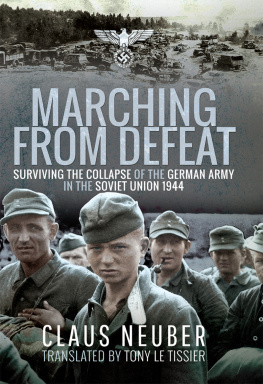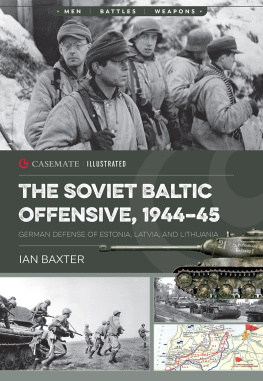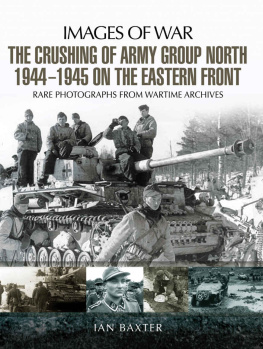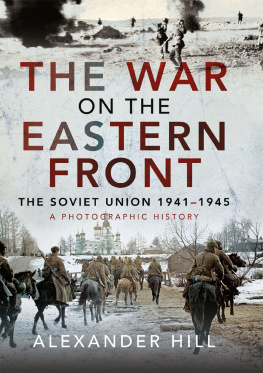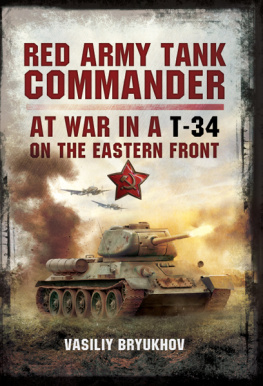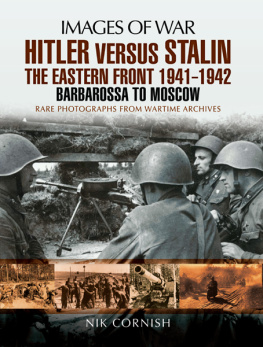Pagebreaks of the print version

Marching from Defeat
Marching from Defeat
Surviving the Collapse of
the German Army in
the Soviet Union, 1944
Claus Neuber
Translated by
Tony Le Tissier
First published in Germany by
Druffel & Vowinckel in 2014
First published in Great Britain in 2020 by
PEN & SWORD MILITARY
An imprint of
Pen & Sword Books Ltd
Yorkshire Philadelphia
Copyright German text of Marsch aus dem Untergang Claus Neuber 2014
Copyright English translation Pen & Sword Books Ltd 2020
ISBN 9781526704283
eISBN 9781526704283
Mobi ISBN 9781526704276
The right of Claus Neuber to be identified as Author of this work has been asserted by him
in accordance with the Copyright, Designs and Patents Act 1988.
A CIP catalogue record for this book is
available from the British Library.
All rights reserved. No part of this book may be reproduced or transmitted in any
form or by any means, electronic or mechanical including photocopying, recording
or by any information storage and retrieval system, without permission from the
Publisher in writing.
Pen & Sword Books Ltd incorporates the imprints of Pen & Sword
Archaeology, Atlas, Aviation, Battleground, Discovery, Family History, History, Maritime,
Military, Naval, Politics, Social History, Transport, True Crime, Claymore Press,
Frontline Books, Praetorian Press, Seaforth Publishing and White Owl
For a complete list of Pen & Sword titles please contact
PEN & SWORD BOOKS LTD
47 Church Street, Barnsley, South Yorkshire, S70 2AS, England
E-mail:
Website: www.pen-and-sword.co.uk
Or
PEN AND SWORD BOOKS
1950 Lawrence Rd, Havertown, PA 19083, USA
E-mail:
Website: www.penandswordbooks.com
Publishers Note
C laus Neuber was born in 1924 in Frieburg, Silesia. In 1924 he passed the Arbitur at the Senior Secondary Modern School there, immediately thereafter being called up by the Wehrmacht as a wartime volunteer in an artillery regiment, and was sent to the Eastern Front in 1943 as a Second Lieutenant of the Reserve.
Following the collapse of Army Group Centre in the summer of 1944 he became a returnee, a soldier seeking to rejoin the fighting troops after this defeat, and was temporarily taken prisoner by the Soviets, but escaped and eventually successfully managed to cross back into the German lines. In 1945 he was posted to a unit in France, where he was captured by the Americans and then released in 1946.
After his release he was employed as an assistant in a chemical factory in Hameln, gaining laboratory assistant status and eventually passing the state pharmaceutical exams in 1954 and becoming a fully qualified chemist. In 1961 he became an active medical pharmacist officer in the Bundeswehr, later rising to commander of a medical battalion and then in 1972 was appointed head of the Reserve medical staff before retiring to Bonn in 1984.
Neubers manuscript originated in a report written in the autumn of 1944 while the experience of his escape from the collapse of Army Group Centre during the summer months of 1944 was fresh in his mind. This was the greatest catastrophe of the German army in the Soviet Union. The then short report was required from the surviving troops in order to create a detailed account of what had happened. Later amendments and additions were made in light of further research.
Introduction
J une 1944 in just three months the fifth year of the war will come to an end, and in a few weeks, on 22 June, it will be the third anniversary of the attack on the Soviet Union, Operation Barbarossa.
Following the fall of Stalingrad on 2 February 1943 and the collapse of our last large-scale offensive near Kursk and Orel in July of the same year, Operation Zitadelle, it was certain that the Soviets would win.
Our armies stood on the defensive everywhere, long since robbed of their full fighting strength in expensive, hard battles. By May 1944, in the southern sector of the Eastern Front, large areas of territory had been abandoned, including the whole Crimean peninsula with its once so hotly fought-over Sevastopol fortress as well as the important harbour city of Odessa on the Black Sea and Kiev, the capital of the Ukraine.
In the north of the front the Soviets had been able to break the ring around Leningrad and push forward as far as Lake Peipus, and in the central sector Smolensk had been lost.
Now at last a pause in the fighting occurred on the whole front. The Soviets used it to prepare their largest operation to date. It had the code name Operation Bagration, the name of a meritorious Russian general in the 1812 war against Napoleon, and aimed at the destruction of the Grande Arme in the fields that in the following weeks would once again become the backdrop to events of Napoleonic proportions.
This operation was against the four armies of Army Group Centre in White Russia (also known as White Ruthenia or Byelorussia), which in the last months, despite continual and extraordinarily strong attacks, had been maintained. From north to south were: the 3rd Panzer Army, led by Colonel General Reinhardt, the 4th Army, under the command of General of Infantry von Tippelskirch, the 9th Army, which was led by General of Infantry Jordan, and the 2nd Army, under Colonel General Weiss. Commander-in-Chief of Army Group Centre was General Field Marshal Busch, who had set up his headquarters in Minsk, the capital of White Russia.
The front line of the army group resembled a gigantic roughly 1,100 km-long semi-circle, which began north-westerly from Vietbsk near Polozk and ended in the south close to Kovel. In the centre of this curve in the front, the most easterly and most exposed section, the so-called Dnepr Balcony, ran along the main front line in an area eastwards from Mogilev and Orsha, which in the Wehrmacht reports was described as the fighting area between the Dnepr and Tschaussy and jutted out from there for up to 50km wide over the river. From here it was 400km as the crow flies to Moscow and just over 600km to the East Prussian border.
In order to determine Soviet operational plans Stalin summoned the commanders in chief of the fronts, as the Red Army described them, to him in the Kremlin. They were as follows: Army General Bagramian (1st Baltic Front), Colonel General Sacharov (2nd Byelorussian Front) and Colonel General Tscherniachovski (3rd Byelorussian Front). Added to these were the coordinators at that time of two of these fronts, the Marshals Vassilevski for the 1st Baltic and 3rd Byelorussian Fronts and Zhukov for the 1st and 2nd Byelorussian Fronts, as well as some generals of the air forces and members of the war council.
Beside the military, the Foreign Minister Molotov and Stalins long-time adviser Malenkov also attended, which indicated the significance of this planned great offensive.
Stalin opened the talks briefly and succinctly with the words: You have the task of fighting for the liberation of White Russia. This will begin on the third anniversary of the German invasion of our fatherland.
When they concluded on 23 May after 30 hours of discussion, the operational plan was confirmed: the Red Army would start major attacks at six widely separated places at short intervals, split up the German defences and take the opportunity to push their forces onto the defence, with the broken up units to be surrounded and destroyed. The operations would be supported by the air forces, the Byelorussian partisans and the Dnepr Fleet.

